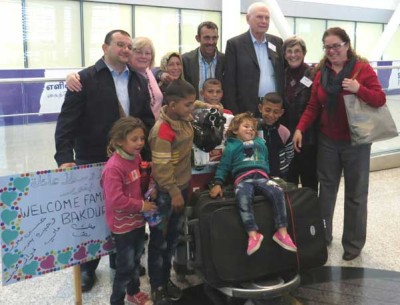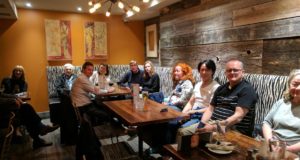Eric Morse —
While Gov. Gen. David Johnson was convening Ministers and national non-profits at Rideau Hall Dece.1, a small group of community workers and volunteers called Community Matters was gathering in the quieter surroundings of St. James Town to begin planning how to resettle and integrate Downtown Toronto’s share of the anticipated 25,000 Syrian refugees who will arrive early in the New Year.
The combination of a tight timetable, overwhelming public support and a scarcity of know-how is forging all kinds of impromptu links at all levels from national to neighbourhood, but as this is written much of the effort seems to be falling into place.

The Bakour family, sponsored by Metropolitan United Church, arrived on Dec.6. (Photo by Mary Stockdale Vernon.)
As Community Matters co-head Chris Hallett told The Bulletin, the high profile generated by the big mid-December arrivals at Pearson and Montreal of privately sponsored people who were already in the refugee pipeline has given invaluable time for local levels to get organized for the surge.
Their Dec. 1 meeting was a small group including several volunteers and a couple of enthusiastic Cabbagetowners who wanted to help sponsor families, and it was information-giving at its most basic level. The second meeting The Bulletin attended, on Dec.15, was larger and conveyed a sense of purpose and efficiency that might have embarrassed the Prussian General Staff.
In the room were a lawyer, an adaptive psychology counsellor, a pharmacist, two social media experts, almost all of them St. James Towners. Almost all Arabic-speaking. Plus members of two or three Syrian families who needed help getting their relatives into the pipeline. And with the exceptions of Hallett and communications adviser Steve Watt from the Rotman School, almost all women.
“That was what hit me when I first got in touch,” said Watt. “It goes completely against the stereotype we have of Arab societies.” But as Hallett explained, when families arrive, the men usually go straight into the workforce, and it is the women who do the heavy lifting of resettlement and integration.
Community Matters has been in the resettlement/integration business for 15 years. They know that when the wave of culture-shocked, often traumatized arrivals hits Downtown, St. James Town will be the centre of impact and they will be ready with interpreters, Arabic-language websites and Facebook pages (Syrian Sanctuary, with English and Arabic videos) and printed handbooks.
Though primarily a resettlement agency, as a registered charity they have attracted funds and thanks to some remarkable generosity from various donors, mainly anonymous but including the Geoffrey Wood Foundation, they had raised about $70,000 in 2.5 weeks and were aiming at sponsoring three to five families on their own (they already have enough donations in kind to furnish about five apartments, Hallett’s partner Margaret Coshan estimates.) Each private sponsorship requires the raising of a minimum of $27,000 —one year’s subsistence —up front before the government will even issue application forms. There are three categories of sponsorship: private, government and blended (co-funding); Community Matters are looking at the blended category.
Metropolitan United Church had a project in the works for some months when the wave began, and Fr. John Joseph Mastandrea reports that the Bakour family, father Hussein,
mother Wahida and sons Ali and Fawaz (10-year-old twins), Mohammad (7) and daughters Malak (6) and Rahaf (2) arrived Dec. 6 and are settling in nicely in a house at Main and Danforth.
The church is having no trouble with fundraising—a common theme from everyone The Bulletin has talked to—it is resettlement skills that are badly needed. Central Neighbourhood House has also taken up the challenge. Director Elizabeth Forestell told the Bulletin that along with their partner Neighbourhood Link in the east end of Toronto they had first set a goal of $40,000, but since it has been met and exceeded they are now looking at sponsoring two large families (of 10 to 15 members each) and one small one, and a fundraising goal of $150,000.
CNH board member Jennifer Rae, who has been active in fundraising, said: “Liz has given great leadership, as have her team. The enthusiasm has been matched by the huge generosity of friends old and new, across Cabbagetown and beyond.
It’s wonderful to be part of a collective welcome to these families who have survived unimaginable hardship. We can’t wait to support them as they find new beginnings.” JoAnne Arcand attended the Dec. 1 Community Matters meeting representing a small group of Metcalfe St residents. The group now counts about 40 members across Cabbagetown and calls itself Cabbagetown NASRA (Neighbourhood Association for Syrian Refugee Assistance); “nasra” means helper in Arabic. Fundraising is going well. They are directly sponsoring families and also contributing to CNH’s efforts, and are working with the Refugee Sponsorship Training Program of Citizenship and Immigration Canada
Back at the Community Matters meeting, the group has split into two tables. At one, Coshan is explaining categories, requirements, handbooks and forms to her resettlement teams. At the other, Hallett has efficiently triaged the Syrians looking for help—one is a simple family reunification case (“But they’re never as simple as they look”); another gentleman’s family—brother, sister-in-law and three kids in Turkey—are indeed refugees but should present no problem since they are already registered. “All we have to do now is get them into a camp,” says Hallett, with the air of a man for whom getting someone into a refugee camp is all in the day’s work.
For further information, the Cabbagetown Residents Association has a directory of key agencies: Syrian Refugees in Cabbagetown
 TheBulletin.ca Journal of Downtown Toronto
TheBulletin.ca Journal of Downtown Toronto


